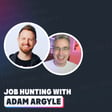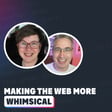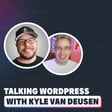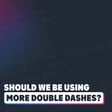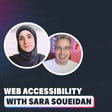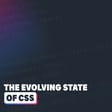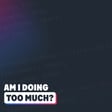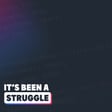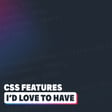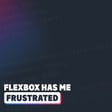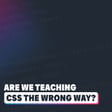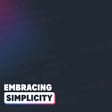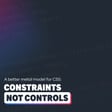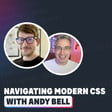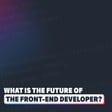Become a Creator today!Start creating today - Share your story with the world!
Start for free
00:00:00
00:00:01

How teaching helped me become a better developer
In this episode, Kevin discusses the benefits of teaching as a way to enhance your learning. He shares his personal experience of teaching and how it helped him deepen his understanding of CSS. Kevin emphasizes the importance of building a strong foundation and filling in knowledge gaps through teaching. He encourages listeners to start a blog or any public-facing platform to share their learnings and insights. Teaching not only helps you solidify your knowledge but also benefits others who are trying to learn the same thing.
Transcript
Introduction to General Musings
00:00:00
Speaker
Hi there, my front-end friends. Welcome to my podcast, General Musings. My name is Kevin, and here at my podcast, I talk about whatever is front of mind for me in any given week, usually in some way or another that's related to front-end development, though. It's because normally what I do is nerd out about CSS.
00:00:15
Speaker
And this is sort of my audio only outlet now that I'm doing. If you've been following the podcast previously, it is in its new form now, which is going to be a little bit more relaxed, a little less formal and more tangential to my newsletter rather than being directly. I used to be using my newsletter as a script. Now it's going to sort of be an expansion upon parts of my newsletter. And this week's
Teaching as a Learning Tool
00:00:39
Speaker
topic is going to be about
00:00:41
Speaker
How you can step up your learning game or supercharge your learning through teaching and if you've. Followed me for a little while you might have heard me say this before and if that's the case and you got whatever i don't wanna listen to this again i'm gonna be doing it a little bit different.
00:00:57
Speaker
this time around so maybe stick around. I want to talk a little bit more about my personal experience with it actually and then we'll sort of circle back around a little bit but before I even get to that I just want to say the reason I'm even mentioning it is because I recently did an interview with Yuna Kravitz and she brought it up.
00:01:13
Speaker
or I think I brought it, I don't remember who, one of us brought up sort of, it came along in conversation, I don't know, but in, she was talking about how she always recommends to bootcamp students to start a blog about what they're learning. And while she shared a lot of the things I'm going to be saying today are things I've said previously as well, one of the things that she said that was a really good point that I didn't think about was that
00:01:39
Speaker
creating a public facing blog or if you do a YouTube channel or if you do a podcast, whatever it is, a public facing way of doing this teaching over keeping them personal notes and things like that.
Public Teaching and Career Benefits
00:01:54
Speaker
There's a nice potential there to show as a showcase for your potential future employers, right? It shows the skills you've mastered and all these other things in a really nice way and how you can talk and, you know,
00:02:06
Speaker
If somebody is reading your technical writing and it's good high quality stuff, even if it's short blog posts, you don't have to make these 2000 word long things. You just have to describe and explain a concept that you've learned about. That's a really good skill to show to potential employers. So just throw that out there as a secondary benefit.
00:02:27
Speaker
Another secondary benefit, of course, is that you can also help other people who are also trying to learn the same thing as you. So you've just learned it. There's someone else who's trying to figure that out, that means. So you're benefiting them. It might not be a lot of people. When I started my YouTube channel, I was happy if I got views on a video for a long time. And you might not think so now. If you look at where my YouTube channel is now, I'm coming up on 900,000 subscribers.
00:02:53
Speaker
I always get tens of thousands, if not hundreds of thousands of views on a video, but I still remember the days when I was happy when a video had views early on. That was exciting, right? So it doesn't matter if it's two people. And the reason I stuck with my YouTube channel is because it didn't matter if no one was watching it because I would have given up on it really early on.
00:03:14
Speaker
The reason I started my YouTube channel was a selfish one because I wanted to do it for myself. And if
Teaching for Personal Motivation
00:03:20
Speaker
you start any sort of public facing teaching of any kind, I want the primary reason you do it to be a selfish one as well. And that might seem a little bit weird, but first of all, it's going to keep you going. And if you're doing it for yourself as the primary thing,
00:03:38
Speaker
that's going to keep you motivated to keep going with it probably more than if you're trying to get lots of views and other things like that. Because as views go up and more people see things and all of that, it's a never ending thing. You always want more. Whereas if you're doing it for yourself, then you're going to be able to keep up with it and stay motivated with it a lot easier. And if you've never done any sort of teaching in any way,
00:04:02
Speaker
you're going to be amazed by what happens. As I said, I want to talk a bit about my own experience with this. The way I found out that teaching makes you actually learn a subject better is when I started teaching in the classroom. At that point, I'd been making websites for quite a while. I'd been doing WordPress development, a lot of child themes where I was stripping down the CSS and writing completely custom CSS for every project I was doing.
00:04:29
Speaker
And I was pretty good at it at that point, or I felt very good about it. How's that? I got to the classroom and I had to teach it. And I realized I was able to do things, but I didn't really know why or how, I guess. Right. So it was, I could follow these patterns that I'd been doing and then these different things that I'd learned along the way. And I can make these tweaks that I needed to change and other stuff like that.
00:04:54
Speaker
But then when a student would be like, well, you know, why does that work is their use case would be a little bit different or there'd always be these things that would come up in the classroom and good questions and stuff. And you're sort of going, oh, man, I don't know because right. That's sort of like when your kids ask you why because I'm the teacher, I'm the parent, let's never do that. Right. But that's sort of the at the beginning where I just be like,
00:05:19
Speaker
realizing very quickly that I needed to learn more and get deeper into things. So when somebody asked me a question, I actually have an answer for them.
00:05:28
Speaker
Uh, and sometimes that would actually happen while I'd be talking out loud to them. So I'd be giving a lesson on something and I'd be saying something and I never explained this thing before. It could be as simple as like the box model or something silly, right? And I'm explaining out loud how the box model works. And I've always known this, the information's been at the back of my head and that first time saying it out loud, all of a sudden.
Insights and Knowledge Gaps Through Teaching
00:05:52
Speaker
This light bulb would go off in my head as I'm talking out loud to the classroom and make this realization about something that I've done before and understanding how it works. And this happened to me so many times. It wasn't almost every time I'd be explaining a subject for the first time.
00:06:11
Speaker
I'd have some sort of light bulb moment. It's just these connections that you make because all of a sudden you have to draw into a little bit deeper of a knowledge and try and make sense of something and you just draw out these extra insights that you wouldn't have had if you weren't trying to explain it. And obviously I was talking out loud to my class. I've had the same thing happen when I'm writing.
00:06:33
Speaker
where when you're writing something, you have to explain it still. And as you're trying to explain it, you come across these same realizations. Sometimes you make connections to things. Like I said, you realize, oh, that's why that worked. And it's this really cool insight that you get. Other times you're trying to explain something and you have no idea how. And you realize that you have this knowledge gap that you didn't know that you had.
00:07:01
Speaker
Because, you know, let's say CSS is what I know. So when I would be doing it, I'd be teaching these things and I'd be realizing, OK, I learned the fundamentals of CSS and then started doing other stuff with it. And I never went back to those fundamentals. And there's actually holes. There's things in those fundamentals I don't understand either the impact of or there'd be holes in the fundamentals that I just things I just didn't know.
00:07:25
Speaker
And it seems crazy that I've been writing CSS for years at that point. I've been teaching it and I'd still have these fundamental gaps in my knowledge. And it made me, I'd be preparing my lesson plan and I'd be like, I can't explain that. And that was at the point when I was realizing that I needed to plan things out a little bit better and know everything I wanted to talk about.
00:07:47
Speaker
And that first class when people started asking questions and I had no idea it was a shock to me, but I figured things out after that. And so I'd be planning them better. And yeah, I would be looking at what I'd be explaining and be like, I have no idea. And then so I'd be on MDM or watching other YouTube videos and trying to understand why that thing worked the way it did. And then it would often be linked to
00:08:13
Speaker
Some other you know it that knowledge should be built on something else that I didn't know and then I'd realize okay I need to figure that out and that filled in all these cracks and all these gaps that were in my knowledge in this foundational stuff that you think that you know because you've been using a language for
00:08:30
Speaker
whether it's six months or two years or five years or whatever it is you're filling in all of these holes and then all of a sudden by filling in those holes you've learned that one thing you were trying to get you can explain that but other things start making more sense too and then when you're learning other new things
00:08:48
Speaker
you're building it on top of that really strong foundation now instead of sort of the rickety one that you had before. And it wasn't your fault you had a rickety foundation before. You were doing stuff, you were building stuff, you felt comfortable with what you were doing and you don't realize that you have holes and it's through trying to explain things that you find those holes.
00:09:09
Speaker
And then you have that stronger foundation and new things become so much easier. When you start playing around with something, you all of a sudden can make these connections because you have that stronger foundation, or you're going to try something really weird. You're trying to solve a problem.
00:09:29
Speaker
And that's how you end up making these weird sort of leaps. And I'm sure you've seen code pens or examples of stuff other people have done. Maybe I've even done stuff in YouTube videos, Rick. Oh, that was really clever. How do you think of that?
00:09:43
Speaker
you think of it, these things become a lot more easier to come up with, I'll say, when you have that really, really, really strong foundation. Because you understand the connection between different things, you understand how maybe I can take this one little thing and twist it in a different way to use it. And again, I'm getting a little bit repetitive now, I apologize for that, but just the importance of
00:10:09
Speaker
Building that strong foundation can't be overlooked. And the best way to do it is to explain things because it highlights everything. It makes you make new connections and it fills in all those cracks in your knowledge.
Encouragement to Share and Teach Publicly
00:10:21
Speaker
So I really would encourage you if you don't have a blog or if you have one that you let die to go and start one back up again and hit me up on Twitter or Mastodon with a link.
00:10:33
Speaker
and share it with me if you want me to boost the signal of it a little bit because you'd like a few more eyeballs on it. But definitely go and do it and do it for selfish reasons because I promise you that if you've never done this before and you've listened to me say it and maybe some other people say it that this whole explain things or teach things and it's going to make you better,
00:10:54
Speaker
understanding of something and it's easy to dismiss. It's easy to be lazy about it, but it's easily the biggest thing that's changed how I write CSS is by teaching it. People ask me how I got really good at CSS and definitely part of it is I've been writing it for over a decade now. I've been teaching it for over a decade now for that matter.
00:11:18
Speaker
So I've been writing it for a really long time. And obviously just by writing it for a really long time and getting lots and lots of practice over all of that time, that's a huge contributing factor that you can't overlook, right? You just need to get the reps in.
00:11:30
Speaker
But I also guarantee you that if I'd never started teaching and I'd just been writing it this entire time, I think I'd still be pretty good at it. But I'd be nowhere near as good now or have the knowledge of it that I have now. It is really, really powerful. And I really encourage you to give it a try as you're learning new things. And it does not have to be these huge, in-depth, technical articles.
00:11:55
Speaker
Fine, you know, today I learned you just don't write the thing you learn though, you know, whatever it is. This is how the box model works. I learned about the box model. Don't write that. Give an explanation on what it is that you learned and how it works. If you learned about the flex box stuff or the what collapsing margins are, don't just say what they are, but explain how they work and just go into a little bit of detail to explain things. And it's really
00:12:23
Speaker
going to unlock stuff for you. Please give it a try. I'm really hoping I can at least inspire a couple of people that are listening to this to give it a shot. So I'm pleading a little bit and getting a little bit repetitive. I do apologize for that. So I'll end it here because I don't want to go and become any more repetitive than I've already been.
00:12:44
Speaker
So yeah, thank you very much for listening. I hope you enjoyed this episode. If you do have any things like that, as I said, you've been either a YouTube channel, a podcast, a blog, anything at all where you are making your stuff available in public and you'd like to share it with me, just hit me up on social media and let me know. And with that, I will let you go. So thank you very, very much. And of course, until next time, don't forget to make your corner of the internet just a little bit more awesome.

